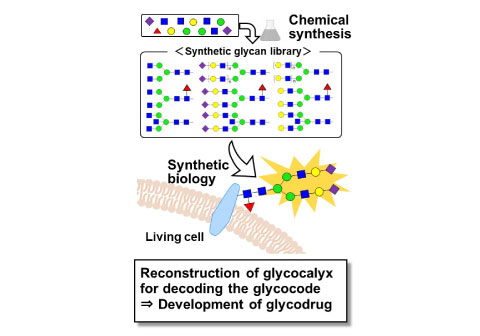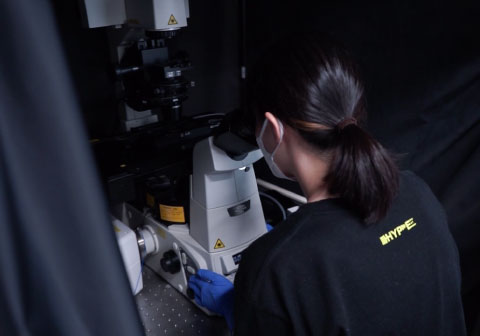
Synthetic approach for revealing glycan functions
Glycans, the third life chain, are involved in many biological phenomena, including infection, cell adhesion, immune response, and cancer. On the other hand, the diversity and heterogeneity of glycan structures make their functional analysis and regulation difficult. Thus, pharmaceutical applications of glycans are limited. We aim to decode and utilize the glycan information (glycocode) based on our technology of precise glycan synthesis. We hope that our project will lead to the creation of novel glycodrugs.
FEATURE
Precise glycan synthesis
Glycan editing on cell surface
Innovative regulation of biological functions using glycans
RESULTS
Research progress
Precise glycan synthesis and development of innovative methods for regulating biological functions using glycans
Glycans cover the cell surface as a glycocalyx and regulate various biological events. However, the difficulty of glycan synthesis with complex structures has prevented the functional study of glycan at the molecular level. We are leading the world in the chemical synthesis of glycans, and have synthesized various bioactive glycans. We are also developing innovative methods to regulate biological functions by introducing these synthetic glycans into proteins or cell surface using synthetic biology methods.

Further development
Opening the door to glycodrug by synthetic approach
Many diseases are caused by disturbances in homeostasis, and glycans play an important role in maintaining the homeostasis. We believe that elucidation and regulation of the glycan functions will enable to restore the homeostatic disturbances in various diseases, including cancer, immunological disorders, and neurological disorders. This unprecedented approach is expected to lead innovative drug development. Our research is also expected to make a significant contribution to cellular medicines, such as iPS cells and CAR-T immunotherapy. Although cells are covered with glycans, glycans have been almost neglected in the cellular medicines. We believe that glycan function control can dramatically improve cellular medicines. Overall, this research project aimed to elucidate the glycan functions at the molecular level and promote their utilization for novel glycodrugs.
